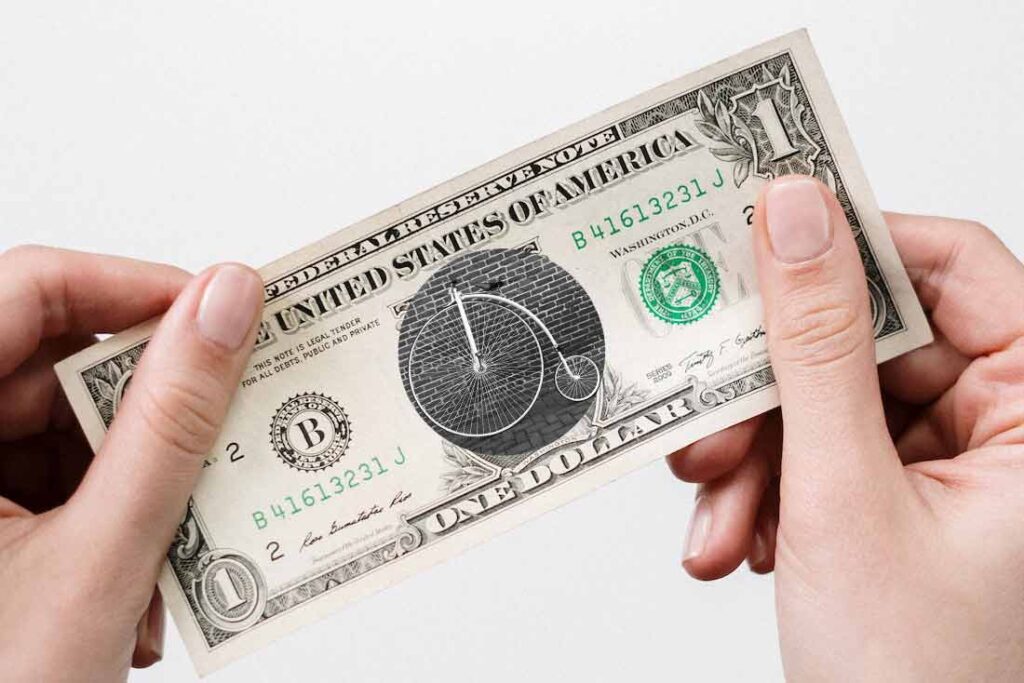Pennies on the dollar
Pennies on the dollar is a quite complex English expression in that it has several distinct meanings. Firstly, for non-Americans and those unsure of these terms, let’s define what pennies and dollars are.
A penny is 1 cent, there are 100 cents in a US dollar (100c = 1 USD). Therefore, a penny is 1 percent of a dollar. Let’s take a quick in-depth look at both of these forms of currency.
The penny comes as a bronze-colored coin that has the 16th US President Abraham Lincoln on one side. The name penny was borrowed from the British penny. It should be noted that Lincoln wasn’t always on the coin, his head was introduced to it in 1909 which coincided with his 100th birthday. The original penny was made out of pure copper which was later diluted with some nickel, tin, and zinc, and at one point (WWII), was zinc-plated steel. The modern penny is actually copper-plated zinc, of which there is only 2.5% copper!
The dollar of the United States of America was originally only a coin. Later in 1953, the 1 dollar note was created with the face of the USA’s first president George Washington on it. Both the coin and the note have a rich history of transformation over the years. The dollar bills, or greenbacks, are made from 75% cotton and 25% linen.

Pennies on the dollar meaning
One of the most commonly inferred meanings of pennies on the dollar is that a thing is much cheaper than it was in the first place. That is to say, it costs a lot less than it did originally. For example, if you bought a car for 50 000 dollars and then sold it for 10 000, you would have sold it for pennies on the dollar.
Here are some more example sentences with this meaning –
There was a big clearance sale at the furniture shop and she bought a new sofa for pennies on the dollar. (She bought it at a very cheap price)
After he had an accident he decided to get rid of his motorcycle and sold it for pennies on the dollar. (He sold it very cheaply, for much less than what it was worth)
In the above examples, you can see that this idiom means a small amount of money and a lot less than what would normally be expected. We can see that it can be used to describe both a bad deal (selling for a small amount) and a good deal (buying for a small amount).

Another way it can be used is to compare two values of things with each other. If you were to say that “Mechanics in Vietnam work for pennies on the dollar” You are saying that they work very cheaply, in comparison to where you are from.
Similarly, to say that “Clothing in India costs pennies on the dollar” is to say that clothing there costs a lot less than in your country. In both cases, you are saying something is extremely cheap by way of comparison with what you are familiar with.
The phrase “pennies on the dollar” has its origins in the world of finance and business and it can also be used to describe the return on investments. If you invest money in something and make a small return on it you can say that you earned pennies on the dollar. For example, if you buy a house that is old and run down, and then go on to fix it up and sell it for much more. You earn or make pennies on the dollar.
Another example of this might be a person buying stocks or cryptocurrency at a low price that later goes on to become much more valuable. After selling these stocks or currency, the person has again, earned pennies on the dollar.
Pennies on the dollar can also be used to describe something as of little worth. It is used if something’s value has plummeted drastically and is only worth a small percentage of what is. An example of this could be – When the financial crisis hit the company went bankrupt and its shares were only worth pennies on the dollar.

Summary of pennies on the dollar
So, while “pennies on the dollar” is usually used to describe a situation where something has been purchased at a significant discount, it can also be used to describe something that is much cheaper in comparison. It can be used to describe profit made in investment, and finally to say it is essentially worthless and has been sold for a small amount of its potential value.
Now you have a clearer understanding of this idiomatic English expression. Hopefully, you will be able to understand it when it is used, and use it in an accurate way yourself!




